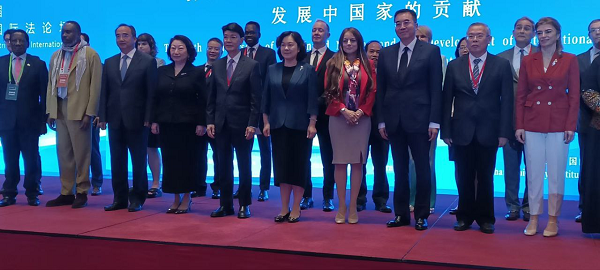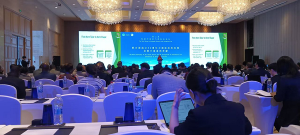
Prominent voices gathered in Beijing yesterday as the Chinese Society of International Law, Asian Academy of International Law, and Wuhan University Institute of International Law jointly convened the Third Forum on Developing Countries and International Law. The landmark event generated robust exchanges with discussions spanning sovereign equality, sustainable development, the evolving role of multilateralism in a changing world order and other aspects.
It is learnt that one of Africa’s enduring gifts to international legal theory is its rich jurisprudence of legal pluralism. Across the continent, customary law, religious law, and formal state law coexist in negotiated, sometimes contradictory, frameworks. This legal polyphony challenges the Eurocentric insistence on a unitary legal order and invites a more plural and dialogical conception of legality, one that embraces multiple sources of normativity and the coexistence of diverse ontological understandings of justice and authority.
During the forum, Hua Chunying, Vice Minister of Foreign Affairs, the People’s Republic of China stated that on this very day 80 years ago, the United Nations was formally established with the signing of the UN Charter. The Charter’s core principles-sovereign equality, prohibition of force, peaceful settlement of disputes, and non-intervention-have served as the corner stone of international law.
It is apt to recall what a few of the UN Secretary General has said about the international rule of law. Kofi Annan said “The rule of law in international affairs is essential if we are to have a world of peace and justice.” In similar veins, Antonio Guterres, the current UN Secretary General said “International law is not just a tool for states; it is a framework within which humanity can pursue justice, peace and development.” As to the role of the UN and international law, Boutros Boutros- Ghali has this to say, “The UN Charter is the constitution of our international community and international law is its lifeblood.”
Yet, we are unfortunately not in a world of peace due to blatant disregard of international law by some. Unilateralism is practiced by some turning a blind eye to the multilateral framework that has been built up by the international community over years. Armed conflict is resorted to by some notwithstanding the call for peaceful resolution of disputes in Article 33 of the UN Charter. The international legal order is at a critical juncture,” the Vice Minister added.
On her part Prof. Hajer Gueldich, Legal Counsel of the African Union said that in my perspective, Africa’s contribution to the development of international law has become more visible, particularly since the wave of decolonization. The creation of the Organization of African Unity in 1963 and later the African Union in 2002 were not merely institutional milestones; they were juridical assertions that African peoples would reclaim the authority to define the norms governing their political and legal destinies.

The Constitutive Act of the AU stands, in my view, as a transformative legal document. Unlike the UN Charter, it embraces the principle of non-indifference over non-intervention, an audacious move that reshaped the contours of sovereignty in favor of collective responsibility. Article 4(h) of the Act, allowing intervention in cases of war crimes, genocide, and crimes against humanity, was a normative leap in the evolution of regional legal regimes.
Africa’s Pan-African jurisprudence also reflects an emphasis on equity, reparative justice, and the democratization of global governance, values that continue to guide our engagements at the UN, the International Court of Justice, and the World Trade Organization.
She emphasized that one notable expression of Africa’s normative agency is the adoption of the Common African Position on the Application of International Law to the Use of Information and Communication Technologies (ICTs) in Cyberspace. This Common Position, developed through a consultative and expert-driven process under the auspices of the AU, articulates shared African views on how existing international legal principles, including sovereignty, non-intervention, due diligence, and international humanitarian law, apply in the digital domain.
The Common African Position does not merely replicate external frameworks. It reflects Africa’s commitment to shaping digital governance grounded in sovereignty, peaceful cooperation, and human-centric development. It also underscores the importance of inclusivity in norm development, especially as cyber-related threats transcend borders and disproportionately affect countries with limited technological infrastructure.
She went on to say that through this Position, African States affirm the applicability of international law to cyberspace, but call for interpretations that respect the unique developmental, security, and human rights contexts of African societies. It is a clear example of Africa asserting normative leadership in frontier areas of law and participating in the co-creation of a more representative and responsive international legal order.
Today, Africa is more than a participant in global legal processes; it is a laboratory and incubator for emerging legal norms, norms that challenge the status quo and offer alternative pathways for global justice. But more than that, I believe we are witnessing the Africanization of international law: a gradual yet assertive reorientation of the global legal order, informed by African epistemologies, value systems, and institutional innovations.
The Africanization of international law is not a rejection of universal norms, but a recalibration, an insistence that universality cannot be claimed without inclusivity. It is a call to reframe legal principles through the lenses of collective responsibility, community-centered justice, and legal pluralism. In doing so, it compels international law to shed its imperial legacy and become more dialogical, equitable, and representative.
Dr. Kamalinne Pinitpuvadol Secretary- General of the Asian-African Legal Consultative Organization (AALCO) emphasized that the year 2025 marks the 80th anniversary of the UN Charter and the 70th anniversary of the Bandung Conference-two milestones that highlight the pivotal role of the Global South in shaping a rules-based international order. These events affirmed the active contribution of developing countries to international law, rooted in the principles of sovereign equality, non-intervention, and peaceful coexistence-principles that remain deeply relevant today.
This Forum provides a timely and much-needed platform for us to collectively reflect on the current developments in international law and their implications for our nations. At a time when the global legal order is facing complex and evolving challenges-from climate change and digital transformation to peace and security-it is imperative that developing countries work together to ensure that their perspectives are represented and respected in the formulation of international legal norms.
He elaborated that the Global South today stands at a crossroads. On the one hand, we continue to confront challenges such as limited participation in global decision-making, legal underrepresentation, and systemic inequalities in international institutions. On the other hand, we are witnessing the growing influence and normative leadership of developing countries in many areas of international law.
As the global order evolves, our role must go beyond participation. We must become co-authors of the new international legal framework-one that reflects our shared histories, diverse legal traditions, and collective aspirations. This is our opportunity to help build a more just, inclusive, and balanced global system.
Expanding further he noted that at the Asian- African Legal Consultative Organization, we have embraced this challenge with renewed focus and purpose. Established in the aftermath of the historic Bandung Conference, AALCO continues to serve as a unique intergovernmental forum that promotes legal cooperation and coordination among its 49 Member States across Asia and Africa.
As the principal legal advisory body for its Members, AALCO plays a vital role in upholding the rule of law and shaping international legal norms through the processes of codification and progressive development of international law. In doing so, it strengthens the collective voice of the Global South and ensures that our legal traditions and perspectives are meaningfully represented in the making of international law.
Professor Huang Jin, President of the Chinese Society of International Law elaborated that this year marks the 80th anniversary of the founding of the United Nations. The United Nations is the most important international organization of the world. It can never be too much to say this even in the recent wars and turmoil in some regions. The United Nations was built on the untold sorrow of mankind during the Second World War, and was designed to save succeeding generations from the scourge of war. It is expected to maintain international peace and security, develop friendly relations among nations, achieve international co-operation and become a center for harmonizing the actions of nations.
As the largest developing country in the world, China is not only one of the original states creating the United Nations, but also one of the permanent member states of the United Nations Security Council, therefore assuming primary responsibility of maintaining international peace and security. Together with other developing countries in Asia and African countries, China made considerable contributions to the formation of modern international law and is becoming more and more active in reforming international law.
Editor’s Note: The views entertained in this article do not necessarily reflect the stance of The Ethiopian Herald
BY ADDISALEM MULAT
THE ETHIOPIAN HERALD FRIDAY 27 JUNE 2025




